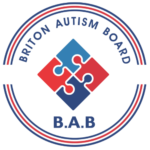Social Skills Development Program for Children
Social Skills Development Program for Children:
The Social Skills Development Program for Children at Briton Autism Board is specifically designed to support children with autism spectrum disorders (ASD) in developing essential social communication and interaction skills. Through a structured and supportive environment, children are provided with opportunities to learn, practice, and generalize social skills that are crucial for navigating social situations and building meaningful relationships.
Program Objectives:
Enhance Communication Skills: The program focuses on improving verbal and nonverbal communication skills, including expressive and receptive language abilities, pragmatic language skills, and understanding social cues and gestures.
Facilitate Social Interaction: Children engage in structured activities and group exercises designed to promote social interaction, turn-taking, sharing, cooperation, and collaboration with peers.
Promote Emotional Regulation: Participants learn strategies for identifying and managing emotions, expressing feelings appropriately, and understanding the perspectives and emotions of others.
Develop Friendship Skills: The program emphasizes the development of friendship skills, including initiating and maintaining conversations, making eye contact, active listening, empathy, and perspective-taking.
Practice Problem-Solving and Conflict Resolution: Children learn problem-solving strategies and conflict resolution techniques to navigate social conflicts, negotiate compromise, and resolve disagreements peacefully.
Program Components:
Structured Group Activities: The program includes structured group activities, games, and role-playing exercises that provide opportunities for children to practice social skills in a supportive and controlled environment.
Individualized Instruction: Instruction is tailored to meet the unique needs and abilities of each child, with a focus on addressing individual goals and objectives identified in collaboration with parents and caregivers.
Positive Reinforcement: Positive reinforcement techniques are used to motivate and encourage children to actively participate in program activities, reinforce desired behaviors, and build self-confidence and self-esteem.
Parental Involvement: Parents are actively involved in the program, receiving regular updates on their child’s progress, learning strategies for supporting social skill development at home, and participating in parent education and support sessions.
Generalization and Maintenance: Skills learned in the program are reinforced and generalized to real-life settings through structured practice opportunities, community outings, and peer interactions.
Program Outcomes:
- Improved social communication and interaction skills
- Increased self-confidence and self-esteem
- Enhanced peer relationships and friendships
- Better understanding of social norms and expectations
- Greater independence and autonomy in social situations
Conclusion:
At Briton Autism Board, our Social Skills Development Program for Children is designed to empower children with autism to thrive socially, build meaningful relationships, and participate fully in their communities. Through targeted instruction, structured activities, and positive reinforcement, children develop the skills and confidence they need to navigate social situations with success and confidence.
